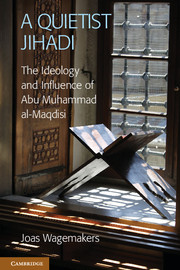Book contents
- Frontmatter
- Contents
- Preface
- Acknowledgements
- Glossary
- Note on Transliteration
- Introduction
- Part I Al-Maqdisi's Life and His Place in the Jihadi Ideological Spectrum, 1959–2009
- Part II Al-Maqdisi's Influence on the Saudi Islamic Opposition, 1989–2005
- Part III Al-Maqdisi's Influence on the Development of al-Walāʾ wa-l-Barāʾ, 1984–2009
- Part IV Al-Maqdisi's Influence on the Jordanian Jihadi-Salafi Community, 1992–2009
- 8 Guidance to the Seekers
- 9 The Leader of the Jordanian Jihadi-Salafi Community?
- Conclusion
- Bibliography
- Index
- References
9 - The Leader of the Jordanian Jihadi-Salafi Community?
Published online by Cambridge University Press: 05 July 2012
- Frontmatter
- Contents
- Preface
- Acknowledgements
- Glossary
- Note on Transliteration
- Introduction
- Part I Al-Maqdisi's Life and His Place in the Jihadi Ideological Spectrum, 1959–2009
- Part II Al-Maqdisi's Influence on the Saudi Islamic Opposition, 1989–2005
- Part III Al-Maqdisi's Influence on the Development of al-Walāʾ wa-l-Barāʾ, 1984–2009
- Part IV Al-Maqdisi's Influence on the Jordanian Jihadi-Salafi Community, 1992–2009
- 8 Guidance to the Seekers
- 9 The Leader of the Jordanian Jihadi-Salafi Community?
- Conclusion
- Bibliography
- Index
- References
Summary
Throughout this study, we have seen that al-Maqdisi's adherence to his own combination of a quietist and a Jihadi-Salafi ʿaqīda and manhaj was instrumental in explaining why he had an impact in certain political contexts and not in others. This final chapter focusses on Jordan in the period 1994–2009, when al-Maqdisi's quietist Jihadi-Salafi manhaj of support for jihad against Muslim rulers in principle, but with a strong preference for daʿwa against them, not only became clear among radical Jordanians but also split them in more or less two groups with regard to this position. While several factors contributed to these divergent views of al-Maqdisi, I argue that his quietist Jihadi-Salafi manhaj is the overarching concept through which these factors should be explained and that accounts for the fact that al-Maqdisi is a major figure among Jihadi-Salafis in Jordan but is not their undisputed leader.
We will start by looking at al-Maqdisi's experiences in prison from 1994–9 and the period afterwards, during which his position as a quietist Jihadi-Salafi became clear, causing differences of opinion to emerge and eventually to become expressed in severe criticism of al-Maqdisi. We then move on to al-Maqdisi's numerous writings from the period 1994–2009, during which he specifically set out his ideas about his ideological enemies, including the Jordanian state and certain quietist Salafis on the one hand and ‘extremist’ Jihadi-Salafis on the other. Finally, we will look at how al-Maqdisi's quietist Jihadi-Salafi framing of his enemies amidst the growing tensions in the Jordanian radical Islamist community accounts for both his influence as well as his lack thereof.
- Type
- Chapter
- Information
- A Quietist JihadiThe Ideology and Influence of Abu Muhammad al-Maqdisi, pp. 213 - 236Publisher: Cambridge University PressPrint publication year: 2012



